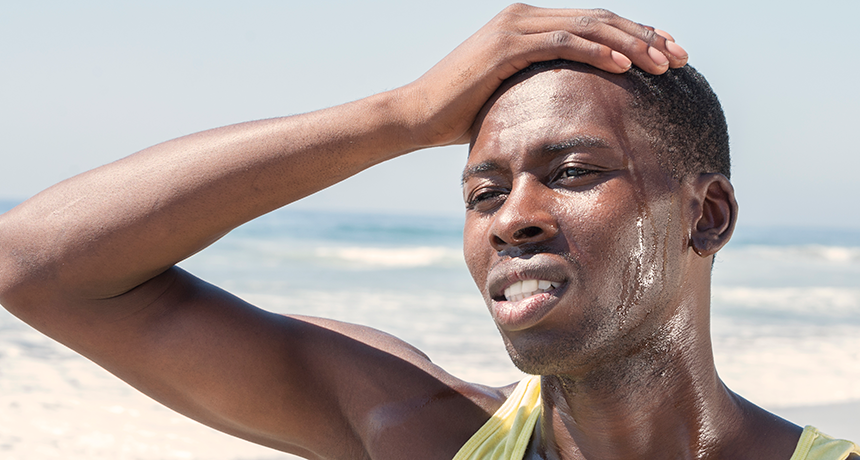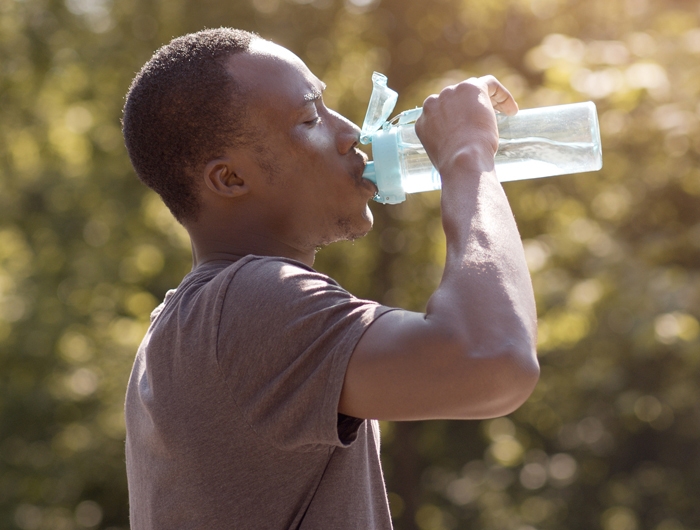Last year, a man was said to have collapsed and died at one of the most popular tourist sites in the world, the Death Valley National Park, California. Reports suggested that his death may have been heat-related, given the notoriety of Death Valley as one of the hottest places on Earth.
Indeed, heat can be dangerous to human health. However, it may interest you to know that you do not have to be at Death Valley or any of the remarkably hot places on the planet before your health can be affected by hot weather. As the challenge of climate change continues to grow, more people across the world are exposed to heat and heat-related illnesses and this trend has been predicted to keep rising. So, anywhere you are; if you can feel the heat, literally, then you should know it can impact your health in various ways.

Here are three notable heat-related illnesses you should be mindful of.
3 Types of Heat-Related Illnesses
Heat Stroke
Heat stroke is the most severe type of heat-related illness. It occurs when the environment is so hot that the body’s ability to regulate its temperature fails. It tends to occur more in children and older people as well as those who overwork themselves during hot weather. Heat stroke is a medical emergency and can be life-threatening if not immediately addressed.
Symptoms of heat stroke
- Very high fever (usually above 40⁰C)
- Red and dry skin
- Dizziness
- Fast pulse
- Headache
- Tiredness
- Confusion
- Nausea
- Vomiting
- Loss of consciousness
Heat Exhaustion
Heat exhaustion occurs when the body overheats and is unable to cool down. This leads to profuse sweating and excessive loss of water and salts from the body. Just like heat stroke, it is common in children and elderly people. However, regardless of your age, you are likely to experience heat exhaustion when you subject yourself to any activity that makes you sweat excessively without taking an adequate amount of fluids. If untreated, heat exhaustion can progress to heat stroke.
Symptoms of heat exhaustion
- Excessive sweating
- Fever
- Fast pulse
- Pale, moist and cold skin
- Headache
- Body weakness
- Nausea
- Vomiting
- Fainting
- Light-headedness
- Muscle cramps
Heat Cramps
Heat Cramps are mild forms of heat illnesses that involve painful, involuntary muscle spasms. They occur mostly among athletes who sweat a lot in hot and humid weather conditions. Excessive sweating deprives the muscles of the salt and water they need to function adequately, resulting in muscle cramps.
Symptoms of heat cramps
- Painful cramps, commonly in the arms, legs, back and sometimes abdomen.
- Red, moist skin
- Excessive sweating.
First Aid in Heat-Related Illnesses
Here are the important first-aid steps you should take in situations of heat-related injuries:
- Move to a cool place and rest; stop participating in the activity.
- Remove excess and tightly fitted clothing.
- Place cool or moist clothing on the skin; fan the skin.
- Give cool fluids containing salt and sugar, if able to drink.
- In cases of heat cramps, stretch cramped muscles slowly and gently.
- Remember that heat stroke is a medical emergency. So ensure that the victim is moved to the nearest hospital immediately. This also applies when the victim is unable to drink, or unresponsive to your first aid.
Preventing Heat-Related Illnesses
Here are general tips to help you navigate hot weather conditions and prevent heat-related illnesses
- Drink a lot of fluids on hot days and even more fluids while participating in vigorous activities. However, avoid alcohol and caffeine-containing drinks as these can get you dehydrated.
- Wear light-coloured, lightweight, and loose-fitting clothing on hot days.
- Schedule sports and other strenuous activities for mornings and evenings and take intermittent rests in between these activities.
- Spend as much time indoors as you can during hot and humid days.
- Use sunshades, umbrellas and sunscreens for protection from the sun. Read our previous post to lean more about how you can prevent sunburn.
- If you have a medical condition, speak with your doctor for expert advice on how you can prevent heat-related illnesses.

A Word from HealthFacts to You
Beyond mere discomfort, heat can affect your health in significant ways. So, in times when the weather is hot, ensure to stay well hydrated, wear proper clothing and as much as you can, schedule activities for appropriate times of the day.










Wow Thanks for this thread i find it hard to come up with smart info out there when it comes to this material appreciate for the information site
This is a really clear post. As someone who blogs, I found this especially timely. If you’re curious, I recently wrote something related on my site too. Keep up the awesome work!
This is a truly clear post. As someone who manages content, I found this extremely applicable. If you’re curious, I recently wrote something complementary on my site too. Keep up the solid work!
Thanks for sharing this insightful article. I discovered some really valuable points here. Keep it up, and I hope to read more from you in the future.
Many thanks for writing this interesting article. I learned some really helpful points here. Great job, and I hope to see more from you again.
Many thanks for posting this insightful article. I discovered some really valuable points here. Keep it up, and I hope to read more from you in the future.
**backbiome**
backbiome is a naturally crafted, research-backed daily supplement formulated to gently relieve back tension and soothe sciatic discomfort.
**boostaro**
boostaro is a specially crafted dietary supplement for men who want to elevate their overall health and vitality.
**aqua sculpt**
aquasculpt is a revolutionary supplement crafted to aid weight management by naturally accelerating metabolism
**hepato burn**
hepatoburn is a high-quality, plant-forward dietary blend created to nourish liver function, encourage a healthy metabolic rhythm, and support the bodys natural fat-processing pathways.
**vivalis**
vivalis is a premium natural formula created to help men feel stronger, more energetic, and more confident every day.
**alpha boost**
alpha boost for men, feeling strong, energized, and confident is closely tied to overall quality of life. However, with age, stress, and daily demands
**nitric boost ultra**
nitric boost is a daily wellness blend formulated to elevate vitality and support overall performance.
**synadentix**
synadentix is a dental health supplement created to nourish and protect your teeth and gums with a targeted combination of natural ingredients
**nervecalm**
nervecalm is a high-quality nutritional supplement crafted to promote nerve wellness, ease chronic discomfort, and boost everyday vitality.
**glycomute**
glycomute is a natural nutritional formula carefully created to nurture healthy blood sugar levels and support overall metabolic performance.
**yu sleep**
yusleep is a gentle, nano-enhanced nightly blend designed to help you drift off quickly, stay asleep longer, and wake feeling clear
**gl pro**
glpro is a natural dietary supplement designed to promote balanced blood sugar levels and curb sugar cravings.
**prodentim**
prodentim is a distinctive oral-care formula that pairs targeted probiotics with plant-based ingredients to encourage strong teeth
**balmorex**
balmorex is an exceptional solution for individuals who suffer from chronic joint pain and muscle aches.
**mindvault**
mindvault is a premium cognitive support formula created for adults 45+.
**vitrafoxin**
vitrafoxin is a premium brain enhancement formula crafted with natural ingredients to promote clear thinking, memory retention, and long-lasting mental energy.
**provadent**
provadent is a newly launched oral health supplement that has garnered favorable feedback from both consumers and dental professionals.
**femipro**
femipro is a dietary supplement developed as a natural remedy for women facing bladder control issues and seeking to improve their urinary health.
**glucore**
glucore is a nutritional supplement that is given to patients daily to assist in maintaining healthy blood sugar and metabolic rates.
**sleep lean**
is a US-trusted, naturally focused nighttime support formula that helps your body burn fat while you rest.
**prostavive**
prostavive Maintaining prostate health is crucial for mens overall wellness, especially as they grow older.
**tonic greens**
tonic greens is a cutting-edge health blend made with a rich fusion of natural botanicals and superfoods, formulated to boost immune resilience and promote daily vitality.
**vertiaid**
vertiaid is a high-quality, natural formula created to support stable balance, enhance mental sharpness, and alleviate feelings of dizziness
**sugarmute**
sugarmute is a science-guided nutritional supplement created to help maintain balanced blood sugar while supporting steady energy and mental clarity
**gluco6**
gluco6 is a natural, plant-based supplement designed to help maintain healthy blood sugar levels.
**oradentum**
oradentum is a comprehensive 21-in-1 oral care formula designed to reinforce enamel, support gum vitality, and neutralize bad breath using a fusion of nature-derived, scientifically validated compounds.
**biodentex**
biodentex is a dentist-endorsed oral wellness blend crafted to help fortify gums, defend enamel, and keep your breath consistently fresh.